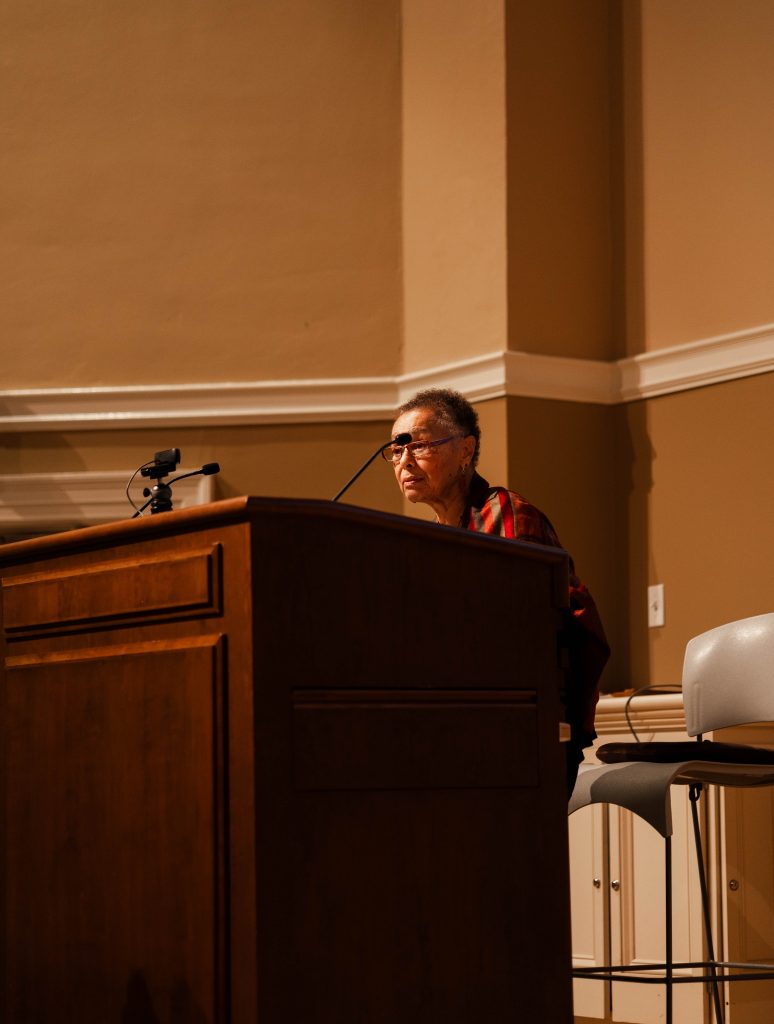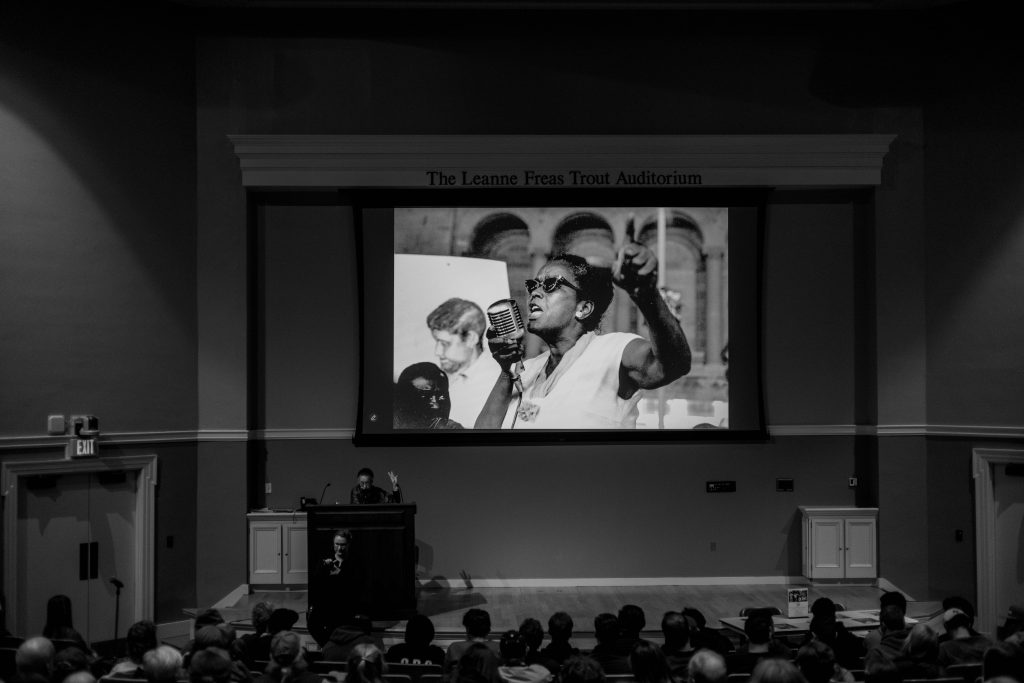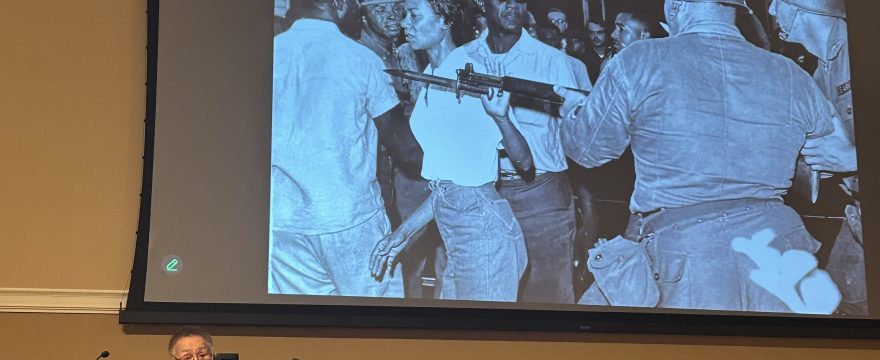
It seems that Punxsutawney Phil isn’t the only thing emerging from the grasslands of Pennsylvania this winter. There seems to be a carousel of change chipping away at the ivy walls of our very own Bucknell University. Whispers of equity and equality lurk around the corners of the great Freas Hall, and in our Chamber of Secrets, I hear the bells of freedom are on strike and will not rest. Our very own Half-Blood Prince of the sort, Civil Rights Activist, SNCC Organizer, and Filmmaker, Judy Richardson, was welcomed to the university on Monday, January 27th, as the MLK Week’s Keynote Speaker where she led a conversation titled We Who Believe in Freedom Cannot Rest. The event took place in the Leanne Freas Trout Auditorium, attracting crowds of Bucknellians and Lewisburg Locals to each seat.
Judy Richardson, born in Tarrytown, NY (which, might I add, is the real-life Sleepy Hollow country), attended Swarthmore College on a full four-year scholarship, where she joined the Swarthmore Political Action Committee (SPAC). SPAC is a Students for a Democratic Society affiliate, which focuses on community service and political action. While in SPAC, Richardson fought for Black women working in the cafeteria to increase their wages and improve their benefits. SPAC Volunteers, including Richardson, then moved on to larger projects such as assisting the Cambridge, Maryland, community in desegregating public accommodations. The group of students soon stated that their main goal of being part of such organizations was to get Black people to the polls and vote without being killed. Richardson eventually joined the SNCC (Student Nonviolent Coordinating Committee) staff at the national office in Atlanta, where she worked closely with, among others, James Forman, Ruby Doris Smith-Robinson, and Julian Bond. SNCC was founded in April 1960 and consisted of mainly Black college students who practiced peaceful, direct-action protests. In her fight for social justice, racial equality, and women’s rights, Judy, with the support of SNCC, brought about 600 White activists to ‘take cover’ for the Black activists during the protests in 1964 Mississippi. These White activists were recruited to bring attention to the cause and push their White peers to explore feelings of empathy and hopefully join the fight for equality.

Photo provided by Griot Photographer, Jean Marie Ngabonziza ’26
In her talk, which primarily recounted her experiences as a Black woman on the front lines for social justice, Judy revolved around the painful point that violence is a systematic pattern of White supremacy, which still survives strongly today. Racism is not only an individual problem, but a systematic problem. Through her activism work, Judy aspired to document the brutality done to Black people to stress the importance of Black Lives mattering because, for many, racism and racial violence are unfathomable thoughts, until seen with their own eyes. Her work in SPAC and SNCC stressed the point that establishing networks and relationships was key to organizing and rallying with adults who wanted real systemic change. Those adults would then guard and guide the younger activities to invoke change fearlessly.
Richardson concluded her talk with some astounding quotes. Two of which stood out to me were, “history vindicates those that are right”, and “until a Black woman’s son is held to the same value as a White woman’s son, we who believe in freedom will not rest”. What a great way to sprinkle in a title drop– I live for those. The first quote stood out to me because it grieves with those who have been wronged by history and continuously are ignored in the present. As Winston Churchill says, “History is written by the victors,” and when we live in an oppressive state that glamorizes and supports White supremacy, all of the victors happen to look alike. I appreciated the surge of inspiration offered to the crowd towards the end of her talk, but do wish that her talk had incorporated more quotes and direct ideas rather than leaving her stories to be interpreted by the audience; it would’ve been more powerful if her stories had been supporting evidence to an overarching idea of freedom and the ways in which we, as collective members of society, can strive for a free, equal, and equitable future.
Nonetheless, the talk was great and provided a helping hand to Tuesday’s speaker, George Takei.
Judy’s experiences in SNCC continue to ground both her film and education work. She is currently co-directing the new visitor center film for the National Park Service’s Frederick Douglass House in Washington, D.C, has co-founded the Drum & Spear Bookstore, which was once the country’s largest African American Bookstore, was on the production team for all 14 hours of the seminal PBS series, Eyes on the Prize, as its series associate producer, then its education director, and then continued to produce documentaries for PBS, the History Channel, and museums. These documentaries include, but are not limited to, the NPS’ “Little Rock 9” visitor center videos, The Orangeburg Massacre 1968 (PBS), and Slave Catchers, Slave Resisters (History Channel). Alongside this, she co-edited Hands on the Freedom Plow: Personal Accounts by Women in SNCC, a compilation of the testimonies of 53 SNCC women, and two NEH three-week teacher institutes co-hosted by Duke University and focused on “Teaching Grassroots Movements in the South”. To conclude her listed achievements, Judy is also a member of the SNCC Legacy Project board, was a Visiting Professor at Brown University, and has an honorary doctorate from Swarthmore College.

Photo provided by Griot Photographer, Jean Marie Ngabonziza ’26
This wave of change was placed brick by brick by Bucknell’s 2025 MLK Week Committee.
–Athaliah Elvis ’26
